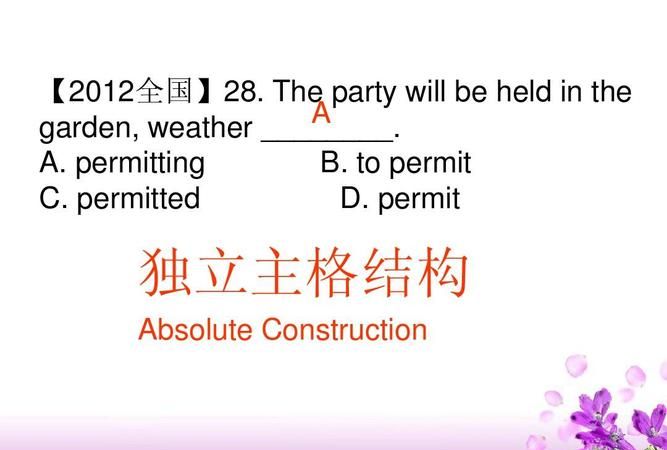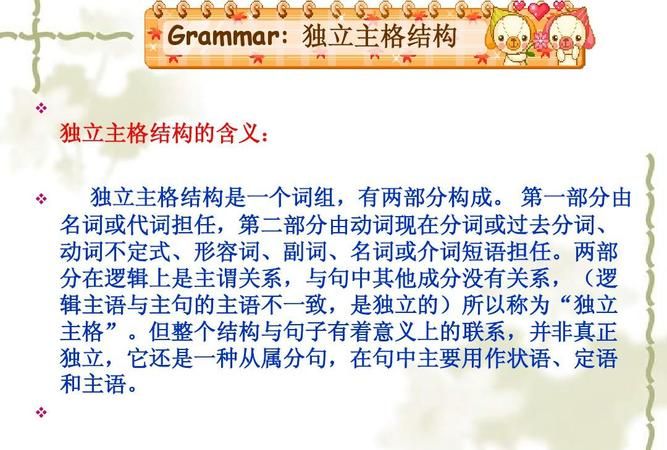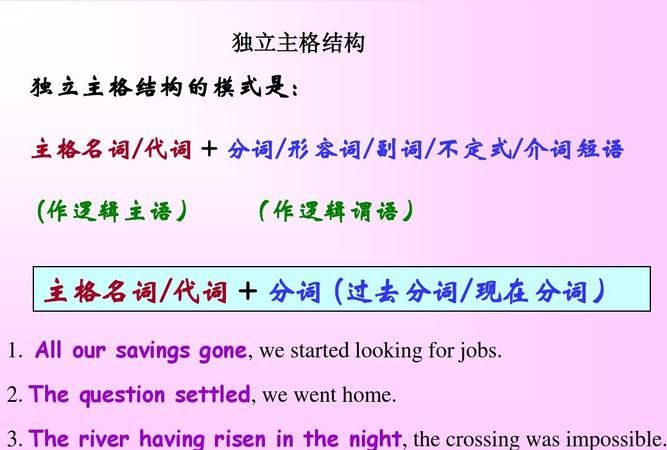本文目录
独立主格如何使用
独立主格结构中的名词或代词与其后的分词等构成逻辑上的主谓关系。这种结构与主句不发生句法上的联系,它的位置相当灵活,可置于主句前、主句末或主句中,常由逗号将其与主句分开。需特别注意的是,独立主格结构与主句之间不能使用任何连接词。 二、独立主格结构基本构成形式
名词(代词)+现在分词(过去分词;形容词;副词;不定式;名词;介词短语) 1. 名词(代词)+现在分词Night enshrouding the earth, nobody could make out what the dark mass was from a distance.黑夜笼罩大地,谁也看不清远处黑压压的一片是什么东西。There being no bus, we had to walk home.由于没有公共汽车,我们只好走回家。 2. 名词(代词)+过去分词The workers worked still harder, their living conditions greatly improved.由于工人们的生活条件大大提高,他们工作得更起劲了。He was listening attentively in class, his eyes fixed on the blackboard. 他上课专心听讲,眼睛紧盯着黑板。 3. 名词(代词)+不定式在“名词/代词+动词不定式”结构中,动词不定式和它前面的名词或代词如果存在着逻辑上的主谓关系,动词不定式则用主动的形式;如果是动宾关系,则用被动形式。The four of us agreed on a division of labor, each to translate a quarter of the book.我们四人同意分工干,每人翻译全书的四分之一。Many trees, flowers, and grass to be planted, our newly-built school will look even more beautiful.种上许多的树、花和草后,我们新建的学校看上去将更美。 4. 名词(代词)+形容词The Trojans asleep, the Greek soldiers crept out of the hollow wooden horse.特洛伊人睡着了,于是希腊士兵从中空的木马里悄悄爬了出来。Computers very small, we can use them widely.电脑虽小,我们却能广泛地利用它们。 5. 名词(代词)+副词The meeting over, our headmaster soon left the meeting room.散会了,校长很快就离开了会议室。The lights off, we could not go on with the work.灯熄了,我们不能继续工作了。 6. 名词(代词)+名词His first shot failure,he fired again.他第一枪没击中,又打了一枪。Two hundred people died in the accident, many of them children.两百人死于事故,其中有许多儿童。 7. 名词(代词) +介词短语He lay at full length upon his stomach,his head resting upon his left forearm.他的脊背朝天,四肢伸展,头枕着左臂,直挺挺地趴伏着。Every afternoon a very old woman hobbled past the old house,a vast load of firewood on her back.每天下午,一个背着一大背柴禾的老妇人都会从那间破旧的房屋前蹒跚着走过。 三、with,without 引导的独立主格结构 with ( without)+宾语(名词/代词)+宾语补足语,宾语通常由名词或代词充当,但代词一定要用宾格。上文的独立主格结构的几种情况都适用于此结构。The girl hid her box without anyone knowing where it was.小女孩把盒子藏了起来,没有人知道它在哪里。(without +名词/代词+动词的-ing形式) Without a word more spoken, she left the meeting room.她没再说什么话就离开了会议室。(without+名词/代词+动词的-ed形式) The kid feels excited with so many places of interest to visit.有这么多的名胜可参观,小孩很激动。(with+名词/代词+动词不定式) The boy was walking, with his father ahead. 父亲在前,小孩在后走着。(with+名词/代词+副词) He stood at the door, with a computer in his hand. 或He stood at the door, computer in hand. 他站在门口,手里拿着一部电脑。(with+名词/代词+介词短语)With his son so disappointing, the old man felt unhappy.由于儿子如此令人失望,老人感到很不快乐。(with+名词/代词+形容词)在with (without) 的复合结构中,多数情况下with 能省略,但without 不能省略。 四、独立主格结构的句法功能 独立主格结构在句中一般作状语,表示时间、条件、原因、伴随状况等,还可以作定语。 1. 作时间状语 My shoes removed,I entered a low-ceilinged room,treading cautiously on the soft tatami matting.我脱掉鞋子后,走进一间屋顶很低的房间,小心翼翼地踩在柔软的塌塌米垫子上。 The governor pondering the matter,more strikers gathered across his path.总督思考问题时,更多的罢工工人聚集在他要通过的路上。 2. 作条件状语 Weather permitting,they will go on an outing to the beach tomorrow.如果天气允许的话,他们将在明天组织一次海滨郊游。 Such being the case,you have no grounds for dismissing him.如果情况如此的话,你没有理由解聘他。 3. 作原因状语 The boy leading the way, we had no trouble finding the strange cave.由那个男孩带路,我们很容易就找到了那奇怪的洞。 There being no further business to discuss, we all went home.没有别的事可讨论,我们都回家了。 4. 作伴随状语或补充说明 I took my ticket,and marched proudly up the platform,with my cheeses,the people falling back respectfully on either side.我拿着车票还有我的奶酪,雄赳赳气昂昂地跨步走向月台。人们似乎很尊敬我,纷纷向两边退去。 Ten students entered for the competition, the youngest a boy of 12.十个学生报名参加了这次竞赛,年纪最小的是个12岁的男孩。 5. 作定语,独立主格结构作定语其功能相当于一个定语从句。 He is the person with a lot of questions to be settled.他就是有许多问题要解决的那个人。He was walking along the road without any street lights on its both sides.他走在一条两边没有路灯的马路上。 Close to the bank I saw deep pools, the water blue like the sky.靠近岸时,我看见几个深池塘,池水碧似蓝天。 五、独立主格结构注意事项 1. 独立主格结构多用于书面语,尤其是描述性语言中,在口语和非正式文体中,一般用从句或两个句子来代替。独立主格结构的逻辑主语与句子的主语不同,它独立存在,名词或代词与后面的分词等逻辑上是主谓关系,独立主格结构一般有逗号与主句分开。 The president assassinated, the whole country was in deep sorrow.总统被谋杀了,举国上下沉浸在悲哀之中。 2. 动词不定式表示动作没有发生或即将发生,动词-ed形式表示动作已经结束,动词-ing形式往往表示动作正在进行。 The manager looks worried,many things to settle.经理看上去很着急, 有这么多的事情要处理。(事情还没有处理,而且是由经理本人来处理,用不定式to settle,表示将来的时间) The manager looks relaxed, many things settled.许多事情已经处理好了,经理看上去很轻松。(事情已经处理好了,用过去分词settled表示动作已经结束) The food being cooked, the boy was watching TV.小孩一边做饭,一边看电视。(两个动作同时进行) 3. 独立主格结构介词使用的问题当介词是in时,其前后的两个名词均不加任何成分(如物主代词或冠词),也不用复数。但 with 的复合结构不受此限制。 A robber burst into the room, knife in hand. ( hand前不能加his)劫匪手里拿着刀闯进房间。 当表人体部位的词做逻辑主语时,及物动词用现在分词,不及物动词用过去分词。 He lay there, his teeth set, his hands clenched, his eyes looking straight up.他躺在那儿,牙关紧闭,双拳紧握,两眼直视上方。 4. 独立主格结构与独立成分的异同 有些分词短语可以独立存在,在句子中没有逻辑上的主语,作为习惯用法。这些短语有:Generally speaking (总的说来),Frankly speaking (坦率地说),Judging from (从……判断),Supposing (假设),等等。 Generally speaking, the rule is very easy to understand.总的说来,这条规则很容易懂。Judging from what he said, he must be an honest man.由他所说的来判断,他一定是一个诚实的人。有些固定短语是带 to 的不定式,表明说话人的立场或态度,在句中作独立成分。这些短语有:to be honest(老实说),to be sure (确实),to tell you the truth (说实话),to cut a long story short (长话短说),to be frank (坦率地说),to make matters / things worse (更糟糕的是),等等。 To tell you the truth, I made a mistake in the word spelling. 说实话,我犯了一个拼写错误。 To make things worse, many of the men have gone off to cities in search of higher pay, leaving women from nearby villages to carry on with the work. 情况更糟的是,许多男人都去城市找工资较高的工作,而留下附近村庄的妇女来继续承担修复工作。 5.独立主格结构与分词短语都可以转换为状语从句。但是独立主格结构转换为状语从句后,它有自己的逻辑主语,与主句的主语不一致;而分词短语转换为状语从句后,从句的主语与主句的主语一致。If time permits, we'd better have a holiday at weekends.转换为:Time permitting, we'd better have a holiday at weekends. 如果时间允许,我们最好周末去度假。 When we see from the hilltop, we can find the city more beautiful.转换为:Seeing from the hilltop, we can find the city more beautiful. 从山顶上看,我们发现这个城市更美了。还必须注意,分词结构的逻辑主语并不总是和主句的主语一致,也可以是主句的其他成分。

独立主格什么时候用ing形式
写文章时用独立主格比用状语从句更简练优美,如果考试的话用独立主格肯定会比用状语从句更加分啊。 比如 When i was a boy,i liked playing football. 这句话如果变成独立主格的话就是 Being a boy,i liked playing football.

在英语中什么是独立主格结构
在作修饰成分 的短语 的逻辑主语 不是 句子主语的时候
也就是 其 逻辑主语 和句子主语 不一致的时候
就需要 用 独立主格结构 作修饰成分
一般 独立主格结构 都是作状语的 也有作定语的情况。
所谓 独立主格结构 就是 自带逻辑主语 的 短语。

英语中的独立主格结构是什么意思
独立主格结构有两部分组成,前一部份是名词或者代词,后一部分是非谓语动词或其他的一些词。前后两部分具有逻辑主谓关系。独立主格结构在句中做状语,多用于书面语。 独立主格结构本身不是句子,在句子中作状语,表示时间、原因、条件、伴随等。 独立主格结构的功能 独立主格结构主要用于描绘性文字中,其作用相当于一个状语从句,常用来表示时间、原因、条件、行为方式或伴随情况等。例如: 1) 表示时间 The meeting being over, all of us went home. 开完会后我们都回家了。 Her work done, she sat down for a cup of tea. 她干完了活,坐下来喝茶。 2) 表示条件 The condition being favourable, he may succeed. 若条件有利,他或许能成功。 3) 表示原因 There being no taxis, we had to walk. 没有出租车,我们只好步行。 He wrapped her up with great care, the night being dark and frosty. 夜又黑又冷,所以他把她裹得严严实实的。 4) 表示伴随情况 Almost all metals are good conductors, silver being the best of all. 几乎所有的金属都是良导体,而银则是最好的导体。(=Almost all metals are good conductors, and silver is the best of all.) 常见的独立主格结构有如下几种: 1. 名词/主格代词+现在分词。名词/主格代词与现在分词之间主谓关系。 如: The girl staring at him (= As the girl stared at him), he didn”t know what to say. 姑娘两眼望着他,他不知道说什么好。 Time permitting (= If time permits), we will go for an outing tomorrow. 如果时间允许的话,我们明天去郊游。 2. 名词/主格代词+过去分词。名词/主格代词与过去分词之间的动宾关系。 如: The problems solved (= As the problems were solved), the quality has been improved. 随着问题的解决,质量已经提高了。 Her glasses broken (= Because her glasses were broken), she couldn”t see the words on the blackboard. 由于眼镜摔坏了,她看不见黑板上的字。 3. 名词/主格代词+不定式。名词/主格代词与不定式之间是主谓关系,且强调的是一次具体性的动作。 如: He is going to make a model plane, some old parts to help. 借助于一些旧零件,他要做一个飞机模型。 They said good-bye to each other, one to go home, the other to go to the bookstore. 他们道别后,一个回了家,一个去了书店。 4. 名词/主格代词+形容词。 如: An air accident happened to the plane, nobody alive. 那架飞机遭遇了空难,无一人生还。 So many people absent, the meeting had to be called off. 这么多人缺席,会议不得不取消。 5. 名词/主格代词+副词。 如: He put on his sweater wrong side out. 他把毛衣穿反了。 The meeting over, they all went home. 会议一结束,他们就都回家了。 6. 名词/主格代词+介词短语。 如: The boy goes to the classroom, book in hand. 那男孩手里拿着书去教室。 Mary was sitting near the fire, her back towards the door. 玛丽靠近火炉坐着,背对着门。 7. There being +名词(代词) 如: There being nothing else to do, we went home. 没有别的事可做,我们就回家了。 There being no further business, I declare the meeting closed. 没有再要讨论的事了,我宣布散会。 8. It being +名词(代词) 如: It being Christmas, the government offices were closed. 由于圣诞节的缘故,政府机关都休息。 It being a holiday, all the shops were shut. 由于今天是假日,所有商店都关门了。 独立主格结构的特点: 1)独立主格结构的逻辑主语与句子的主语不同,它独立存在。 2)名词或代词与后面的分词,形容词,副词,不定 式,介词等是主谓关系。 3)独立主格结构一般有逗号与主句分开。 举例: The test finished, we began our holiday. = When the test was finished, we began our holiday. 考试结束了,我们开始放假。 The president assassinated, the whole country was in deep sorrow. = After the president was assassinated, the whole country was in deep sorrow. 总统被谋杀了,举国上下沉浸在悲哀之中。 Weather permitting, we are going to visit you tomorrow. 如果天气允许,我们明天去看你。 This done, we went home. 工作完成后,我们才回家。 The meeting gone over, everyone tired to go home earlier. 会议结束后,每个人都想早点回家。 He came into the room, his ears red with cold. 他回到了房子里,耳朵冻坏了。 He came out of the library, a large book under his arm. 他夹着本厚书,走出了图书馆 注:独立主格结构有时可在其前加上介词with。 如:Don’t sleep with the windows open. 别开着窗睡觉。 He was lying on the bed with all his clothes on. 他和衣躺在床上。 She came in with a book in her hand. 她手里拿着一本书走了进来。 He fell asleep with the lamp burning. 他没熄灯就睡着了。 I won’t be able to go on holiday with my mother being ill. 因为妈妈有病,我无法去度假。 He sat there with his eyes closed. 他闭目坐在那儿。 All the afternoon he worked with the door locked. 整个下午他都锁着门在房里工作。 I can’t go out with all these clothes to wash. 要洗这些衣服,我无法出去了。 使用独立主格五点注意: 1.独立主格与状语从句的转换当状语从句的主语与主句的主语不是指同一个对象时,可用独立主格结构取代状语从句,但不再保留连词。如:After class was over (=Class being over / Class over), the students soon left the classroom.下课后,学生很快离开了课室。 2. 不能省略being (having been)的情形在下列两种情况下,独立主格结构中的being(或having been)不能省略。 (1) 独立主格的逻辑主语是代词时。如:It being Sunday, we went to church.因为是星期天,我们去了做礼拜。 (2)在There being+名词的结构中。如:There being no bus, we had to go home on foot.因为没有公共汽车,所以我们不得不步行回家。 3. 通常不用物主代词或冠词在“名词(或代词)+介词短语”构成的独立主格结构中,一般不用形容词性物主代词和冠词。如: Miss Smith entered the classroom, book in hand.史密斯先生走进了课室,手里拿着一本书。比较with的复合结构。如:Miss Smith entered the classroom, with a book in his hand. 4. 独立主格结构没有所有格形式The chief-editor arriving, we began the meeting. 主编来主编来了,我们开始开会。(比较动名词复合结构。) 独立主格结构的用法 独立主格结构主要表示谓语动词发生的时间、原因、条件或伴随情况等,相当于一个状语从句或并列句。 1. 用作时间状语:The work done (=After the work had been done), we went home. 工作完成后,我们就回家了。 2. 用作条件状语:Weather permitting (=If weather permits), they will go on an outing to the beach tomorrow. 如果天气允许的话,他们将在明天组织一次海滨小游。 3. 用作原因状语:An important lecture to be given tomorrow (=As an important lecture will be given tomorrow), the professor has to stay up late into the night. 因为明天要发表一个重要的演讲,教授不得不熬夜到很晚。 4. 用作伴随状语:He was lying on the grass, his hands crossed under his head (=and his hands were crossed under his head).他躺在草地上,两手交叉枕在脑后。 5.表示补充说明:We redoubled our efforts, each man working like two. 我们加倍努力,一个人干两个人的活。 *注:独立主格结构表示时间、条件或原因时,相当于一个状语从句,一般放在句首,表示原因时还可放在句末;表伴随状况或补充说明时,相当于一个并列句,通常放于句末。 独立主格结构妙题赏析 请看下面一道题: Not far from the school there was a garden, _________ owner seated in it playing chess with his little grandson every afternoon. A. its B. whose C. which D. that 【分析】此题很容易误选B,许多同学会认为句中逗号后是一个非限制性的定语从句,whose 在定语从句中用作定语修饰其后的名词 owner。此分析从表面上看,似乎天衣无缝,但实质上是错的,原因是空格后根本不是一个句子,因为没有谓语。尽管句中有两个动词,但它们都是非谓语动词。也许有的同学认为,其中的 seated 可视为谓语动词,但是注意,seat 用作动词时,它总是及物的,其后要么接宾语,要么它就用于被动语态,所以若在 seated 前加上助动词 is,则可以选择B(当然若将 seated 改为sitting,也应选择B)。所以此题最佳答案选A。 请再看一个类似的例子: (1) He wrote a lot of novels, many of _________ translated into foreign languages. A. it B. them C. this D. that (2) He wrote a lot of novels, many of _________ were translated into foreign languages.A. it B. them C. which D. that 第(1)应选B,而不能选C,是因为句中的 translated 是过去分词(非谓语动词),若选C,则该从句无谓语;第(2)应选C,因为句中有谓语 were translatedC。 再请看下面一例: (3) He wrote a lot of novels, and many of _________ were translated into foreign languages. A. it B. them C. which D. that 【分析】此题与上面的第(2)题不同,两句间多了一个并列连词and,说明这是一个并列句,故应选B,则不能选C。 请做做以下三题(答案均为B): (1) There I met several people, two of _________ being foreigners. A. which B. them C. whom D. that (2) There I met several people, two of _________ were foreigners. A. which B. whom C. who D. that (3) There I met several people, and two of _________ were foreigners. A. which B. them C. whom D. that

以上就是关于独立主格结构使用条件,独立主格如何使用的全部内容,以及独立主格结构使用条件 的相关内容,希望能够帮到您。

